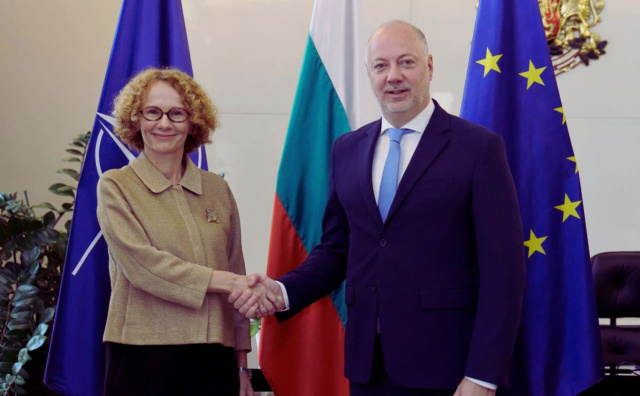NATO Deputy Secretary-General Radmila Šekerinska highlighted Bulgaria’s “exceptional potential” in developing its defense industry during her meeting with Prime Minister Rosen Zhelyazkov at the Council of Ministers. Šekerinska cited initiatives linked to the SAFE mechanism and the recently announced contract with Rheinmetall as clear examples of Bulgaria’s progress in this area.
During their discussion, Prime Minister Zhelyazkov reaffirmed Bulgaria’s commitment to all decisions taken at the NATO summit in The Hague, where he participated personally. These include strengthening deterrence and defense along the Eastern flank, particularly in the Black Sea region, increasing defense spending, supporting Ukraine, and maintaining active collaboration with allies. He noted that Bulgaria has already surpassed 2% of GDP in defense spending, with political consensus to gradually increase it to 5% by 2035.
Zhelyazkov detailed ongoing modernization projects for Bulgaria’s armed forces, including the acquisition of new armored combat vehicles, two multifunctional modular patrol ships for the Navy, the delivery of F-16 fighter jets, as well as artillery, mobile missile systems, 3D radars, air and missile defense systems, and coastal defense solutions. The Prime Minister emphasized that these efforts strengthen NATO’s deterrent and defense posture on the Eastern Flank and in the Black Sea.
Highlighting cooperation with NATO allies, Zhelyazkov pointed to the multinational combat group stationed in Bulgaria, led by Italy and supported by several allied countries, including the Republic of Northern Macedonia. He also referenced the Black Sea antimal counteraction group, which has contributed significantly to security and freedom of navigation in the region.
Regarding regional infrastructure and security, Zhelyazkov underlined the importance of the Paneuropean Corridor VIII, linking the Adriatic Sea through Italy, Albania, North Macedonia, and Bulgaria to the Black Sea. The Prime Minister described the project as critical for the economic growth of the wider region, including the Western Balkans, and urged allies to meet their commitments without delay.
Bulgaria also reiterated its readiness to contribute to future security guarantees for Ukraine. Zhelyazkov said the country could support coalition efforts in the maritime domain through joint mine-countering operations in the Black Sea and provide airspace and logistical support for coalition forces. He praised NATO’s leadership in the Purl initiative, which facilitates the provision of U.S. military equipment to Ukraine.
The Prime Minister expressed concern about ongoing instability in the Western Balkans, citing political polarization, inter-ethnic tensions, institutional deficits, and external hybrid influences. He stressed the importance of strengthening strategic communication through NATO and bilateral channels and reaffirmed Bulgaria’s commitment to regional peace and continued contribution to initiatives like KFOR and Eufor-Althea.
Šekerinska’s visit, scheduled from September 7-12, coincides with the 20th NATO Alliance Emergency Management exercise. The exercise, jointly conducted by NATO’s Euro-Atlantic Disaster Coordination Center and Bulgaria’s Ministry of Interior, includes practical training in Montana and activities at the Novo Selo NATO base. Šekerinska is also expected to deliver a speech at the Atlantic Club and hold several bilateral meetings to assess Bulgaria’s defense initiatives and regional security contributions.
